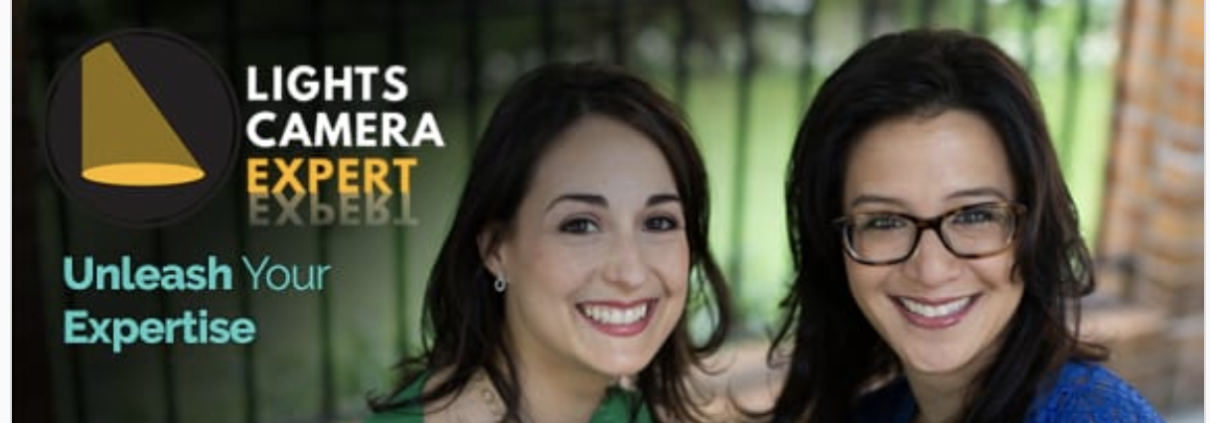You probably have set your sights on some big goals for this year. Like, life goals: Get in shape. Eat cleaner. Read more. Earn more. Finally (finally) get that website up and running.
What does it take? One step at a time: one workout at a time, one page at a time, one hour at a time.
But what about your media goals? Yes. Media goals.
Because just as you wouldn’t simply wait for weight to fall off, or hope a website magically appears, it’s not enough to hope your favorite publication or TV show reaches out.
That doesn’t mean you can’t make media happen!
Rather than make “doing more media” out to be some huge, impossible thing, think of media as another key strategy for reaching your professional goals—just as you might look at writing blog posts, or going to networking events, or doing more public speaking.
So let’s do this! Here are some simple steps to making your media goals a reality this year.
Step 1: Make your media wish list
Go for it—do a brain dump of the kinds of media where you’d like to pitch and be featured. And while the Today show, Oprah magazine, Real Simple, and NBC Nightly News may be high on the list, don’t limit yourself to the big media beasts.
- Make a list of your big-dream publications and shows
- Make a list of your next-level media properties (regional news and magazines, podcasts, websites).
- Write down what you’d be most excited to see yourself doing—whether it’s more on-air segments, more podcasts, or getting quoted as a resource in print stories.
- Now, take a good hard look at those media outlets. Study who and what they’re covering, and where you see yourself contributing!
Step 2: Generate content ideas
If you’re going to get on TV, you’ve got to have something to say, right? You already know plenty about your field, your topic, your expertise. What you have to do next is not get smarter, but savvier in how you share what you know.
Getting the attention of producers and editors starts with fresh ideas, relevant, timely takes, on what you do and what you have to offer.
- Keep a notebook on hand when you’re consuming your favorite media—on TV, podcasts, or blogs, and jot down ideas you go. Don’t second guess! Just get it all down so you have ideas to work with.
- Think about what opinions, facts, and perspectives that maybe weren’t cons
- Check out this recent post to spark new inspiration for generating ideas.
Step 3: Hit “record”
Getting comfy in front of the camera is key to getting asked to be (and crushing it on) TV.
In a recent post, we talked about how to leverage Facebook Live to get on TV. It’s easy, free, and low stakes—with the potential to be more. So start practicing. Take one of your ideas, something you want to teach, hit “go live,” and start talking about what you know best!
The future of the internet is video content. You can get better at this—but not by thinking about it.
Step 4: Brush up on your pitching skills
As we’ve said over and over, there’s a right, and a wrong, way to go about pitching media!
First things first, you have to think about your topic and expertise the way someone would who knows nothing about what you do. Find out how to be sure your pitch passes the fifth grade test. And then, be sure to double check it with our pitching checklist.
Step 5: Learn from the experts
Who do you think we learned from? Pros who have gone before us and who are leading the way. And we keep learning. So yes, while we have a few things to share that we know work, we also make it a point to listen to and talk to the pros to make sure we’re making the best decisions we can.
And now we can all learn together—because we’ll be interviewing entrepreneurs, authors, and industry experts (including folks you have heard of) on our new radio show (that’s right) on Voice America!
Our weekly show, “Lights Camera Expert: Unleash Your Expertise” airs every Monday at 3pm ET / 12p PT!
That one of OUR big goals—practicing what we preach and being our own producers! We couldn’t be more excited for this! Be sure to pop by and check it out (and you can listen to all the episodes here as well as on iTunes and Stitcher.
What are YOUR media goals? We want to know! Pop on over to the LCE Facebook page and share it!
In the age of social media, one word has the power to make our clients do their very best horror film victim impression—brand. (That is, until they talk to us). We know that branding yourself can feel abstract at best and a little hokey at worst. To find your brand, first you have to get clear on what it’s not.
Your brand is not:
- What you do
- Your credentials
- Your title
- Your accolades
- Any label you can find in a dropdown menu
Your credentials, title, and accolades are all a resource for your wisdom. But they don’t lead—you do. And by you, we mean the person behind those titles—the one with passion, drive, opinions, a distinct mission. You are who we want to connect with—not Random Harvard Doctor #4. And your brand is the first point of contact and sum of your customer’s engagement with you.
To find your brand, ask yourself these three questions:
1. Why you? Why this thing?
To connect with you, we need to know your story—your why. What was the moment, the exact scene, you discovered what you were meant to do? What happened that triggered your burning desire to help people with this problem? Your struggles draw us in as much as your expertise.
For example, Dorie Clark is passionate about helping people take control of their professional lives because there were very few opportunities for success in her North Carolina hometown, and she believes everyone should be able to get paid for doing what they love. Farnoosh Torabi is passionate about personal finance because she was once 22 years old, $30k in debt, living in NYC and eating canned tuna. And as she grew up and out of debt, she realized there was a hole in our country’s financial literacy that was leaving young people out to dry.
Your story may make you feel vulnerable. Good. That vulnerability is exactly what let’s your audience in and allows them to feel something for you. Get us invested in your story and we’ll follow you anywhere.
2. Who are you passionate about helping?
One of our favorite exercises to give clients is this fill-in-the-blank:
“I help (people who need/want X) to (benefit #1) and (benefit #2).”
Who are your people? Get specific. Sure, in your practice, you may help everyone. But who do you want to be known for helping? Who do you passionately advocate for or think gets overlooked? There’s a certain demographic of your clientele that hits your expertise sweet spot.
Don’t be afraid to lean into that one thing—your thing. Getting specific about your brand doesn’t limit you—it does the opposite. You have to be specific enough to cut through the din. And once you’ve got people’s attention, your brand can pivot with you—because it is you!
Take Game of Thrones fan favorite Jon Snow. Jon Snow’s brand isn’t “The Night’s Watch.” It’s “honest to a fault, heroic beyond reason, constantly taking up for the underdog.” Who does he love to help? Samwell Tarly. The Wildlings. The downtrodden and abandoned. And because his brand is who he is, it follows him into larger adventures (hello, dragons). It doesn’t limit him—catapults him into his true destiny (R+L=J, y’all) and expands his capabilities. Okay, we’ll stop geeking out.
3. What’s your favorite way to help people?
Get specific about how you help people. For example, say you’re an autoimmune disease expert. Maybe you like to get in the weeds one on one with clients and overhaul their nutrition plan. Or maybe you’re a fabulous curator of autoimmune-safe products, recipes, and routines. Those are two brands that, technically, speak to many of the same things. But how they want to help people sets their brands apart.
And when it comes to your media brand, there are only so many hours in a day. You may want to write a book, host a podcast, give a TED talk, teach an online course, create a YouTube channel, and start a blog. And, in due time, we believe you can do all or most of those things! But right now, start with what you love and the rest will follow. Ask yourself, “Am I itching to write this book or to develop this course?” Your brand will ring truer if you lead with who you are and how you love to be of service. And that will pique the media’s interest.
About Paula & Terri:
Terri Trespicio, Co-Founder, Lights Camera Expert, LLC
Terri Trespicio is a New York–based branding pro and keynote speaker who helps companies and individuals nail their messaging and engage clients, customers, and fans. She speaks widely at conferences and events, and her TEDx talk, “Stop Searching for Your Passion,” has earned more than 3 million views.
A former magazine editor at Martha Stewart’s Whole Living magazine and radio host at Sirius XM, she has appeared on the Today show, Dr. Oz, The Early Show, and The Anderson Cooper Show. She’s been featured in Oprah magazine, Marie Claire, Prevention, Business Insider, Forbes.com and Inc.com, among others. An in-demand speaker and TEDx coach, Terri speaks widely and was rated the #1 speaker at Barron’s Top Women Advisors Summit and How Design live.
Paula Rizzo, Co-Founder, Lights Camera Expert, LLC
A best-selling author and Emmy-award winning television producer for nearly 20 years, Paula has produced health, wellness, and lifestyle segments with a range of top experts, including JJ Virgin, Jillian Michaels, and Deepak Chopra. Most recently she served as the senior health producer for Fox News Channel in New York City for more than a decade.
Paula’s the founder of the productivity site ListProducer.com and best-selling author of Listful Thinking: Using Lists to be More Productive, Highly Successful and Less Stressed, which has been translated into 12 languages and has been featured on many media outlets including Fox News, Fox Business, Prevention, Business Insider, Entrepreneur, Brides and made it on Oprah.com’s list of “Self Help Books That Actually Help.”
You want to be known for what you do. You’re hustling to become a go-to media expert to build your brand, get your business in the spotlight, and change as many lives as you can.
Entrepreneurs want to build their brand, monetize their expertise, and extend their reach to a whole new stream of clients.
Sound familiar?
Becoming a go-to media expert is its own entrepreneurial side hustle—and it’s often in addition to meeting the demands of your own thriving business. And while media attention alone is sometimes it’s own reward, the truth is, you need to monetize and streamline that hustle so that it works for you and your business.
Why? So that you can do more of what you care about and do less of the heavy lifting—e.g. more time changing the world with your expertise, less time learning Hootsuite features.
Enter our friend Dorie Clark’s new book, Entrepreneurial You. Dorie is a marketing strategy consultant and professional speaker who teaches for Duke University’s Fuqua School of Business, is a Grammy-winning jazz producer, and her most recent book, Stand Out, was named the #1 Leadership Book of 2015 by Inc. magazine.
In her latest book, she shares detailed specifics on how to build a thriving business and create multiple streams of income – something that’s valuable not just for entrepreneurs, but also for regular professionals who want to create more security and opportunity in their lives. She shares the stories of entrepreneurs of all kinds—from consultants and coaches to podcasters, bloggers, and online marketers—who have generated six- and seven-figure incomes. It’s a roadmap to becoming the master of your own destiny and getting paid to do what you love.
You can pick up a copy of Entrepreneurial You here, and download Dorie’s free 88-Question Entrepreneurial You self-assessment.



